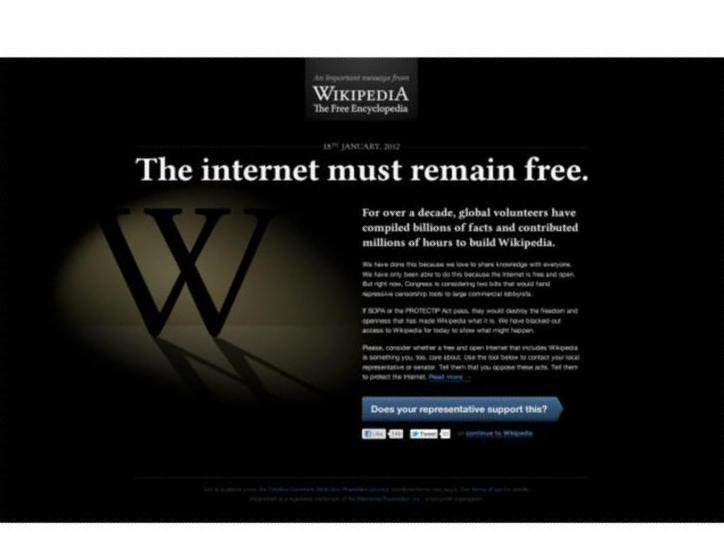Turning Wikipedia black is principled but pointless
We're fighting a battle. The Man's waging a war

Corporations will be quaking in their boots today: to protest the wrongheaded and dangerous SOPA and PIPA legislation in the US, Wikipedia's going dark.
Not only that, but some real powerhouses are doing the same: according to The Guardian, others joining "what has been dubbed 'Black Wednesday' include the user-generated content website Reddit, technology news site Boing Boing, and the Cheezburger network of humorous sites."
The Cheezburger network? Say it ain't so!
Sometimes the jokes write themselves.
Don't get me wrong. I think it's good that Boing Boing urges people to join the EFF. And I think that the proposed anti-piracy legislation, like most anti-piracy legislation, is stupid and dangerous and pointless. But I'm pretty sure turning a few websites dark is pointless too.
We've been here before: in 1996, various sites turned themselves black and others sported blue ribbons to protest the signing of the US Communications Decency Act.
It didn't work then, and it won't work now.
Get daily insight, inspiration and deals in your inbox
Sign up for breaking news, reviews, opinion, top tech deals, and more.
History repeating
The Communications Decency Act did get the boot, but it wasn't because of online protests. An amendment was successfully added by two US Representatives to give ISPs and internet users immunity from prosecution for others' activities - so for example if you ran a website, you couldn't be prosecuted for what your site users posted - and then a succession of court cases demolished the CDA completely.
More recently, and more locally, we had the Digital Economy Bill, now the Digital Economy Act. Despite unprecedented levels of online protest - and a fair bit of offline protest too - the Bill was railroaded into law.
There are two lessons to learn here. One: The Man doesn't care what colour somebody turns their website. And two, while we're outside shouting slogans, The Man is inside, whispering sweet nothings into politicians' ears.
It's no coincidence that according to Private Eye the minister with responsibility for copyright and internet issues, Ed Vaizey, is by far the most heavily-lobbied minister in the government. That lobbying isn't generally coming from supporters of internet freedom.
By all means protest, but be aware that it doesn't change much: SOPA's been shelved and PIPA will no doubt suffer the same fate, but these are tactical withdrawals, not outright surrender. They'll be back with new names, and new language, and the same old supporters, because that's what's been going on for more than a decade.
Copyright industries want the net regulated, and they're willing to spend huge sums to make it happen: SOPA is a battle, but the lobbyists are waging a war.
You don't fight that by turning sites black. You fight it by supporting the EFF, and the ACLU, and the ORG, and by lobbying your elected representatives, and you fight it it in the ballot box. In the last general election just 55% of 25-34 year olds voted, while turnout for the 18-24 age group was a pathetic 44%.
We need to do better, because the best way to fight bad laws is to stop clowns from getting into power in the first place.
Writer, broadcaster, musician and kitchen gadget obsessive Carrie Marshall has been writing about tech since 1998, contributing sage advice and odd opinions to all kinds of magazines and websites as well as writing more than a dozen books. Her memoir, Carrie Kills A Man, is on sale now and her next book, about pop music, is out in 2025. She is the singer in Glaswegian rock band Unquiet Mind.
